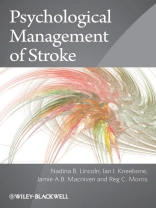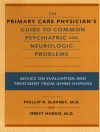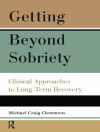Psychological Management of Stroke presents a review and
synthesis of the current theory and data relating to the
assessment, treatment, and psychological aspects of stroke.
* Provides comprehensive reviews of evidence based practice
relating to stroke
* Written by clinical psychologists working in stroke
services
* Covers a broad range of psychological aspects, including
fitness to drive, decision making, prevention of stroke, and
involvement of carers and families
* Reviews and synthesizes new data across a wide range of areas
relevant to stroke and the assessment, treatment, and care of
stroke survivors and their families
* Represents a novel approach to the application of psychological
theory and principles in the stroke field
Содержание
About the Authors vii
Foreword by The Stroke Association ix
Preface xi
Acknowledgements xiii
Section 1 Background to Stroke and Stroke Services 1
Chapter 1 Experiences and Effects of Stroke and Its Aftermath
3
Chapter 2 Clinical Stroke Services 28
Chapter 3 Neurological Basis of Stroke and Related Vascular
Disorders 60
Section 2 Cognitive Effects of Stroke 85
Chapter 4 Neuropsychological Symptoms of Stroke 87
Chapter 5 Screening for Cognitive Problems after Stroke 109
Chapter 6 Neuropsychological Assessment after Stroke 130
Chapter 7 Communication Problems after Stroke 160
Chapter 8 Driving after Stroke 181
Chapter 9 Decision Making and Mental Capacity 203
Chapter 10 Neuropsychological Aspects of Rehabilitation 232
Chapter 11 Cognitive Rehabilitation 248
Chapter 12 Challenging Behaviour after Stroke 266
Section 3 Emotional Effects of Stroke 281
Chapter 13 Emotional Problems after Stroke 283
Chapter 14 Screening and Evaluation of Emotional Problems After
Stroke 299
Chapter 15 Managing Emotional Problems after Stroke 329
Chapter 16 Behavioural and Cognitive-Behavioural Therapy for
Depression after Stroke 336
Chapter 17 Stroke and Fear of Falling 349
Chapter 18 Prevention of Psychological Distress after Stroke
362
Chapter 19 Pain and Fatigue 378
Section 4 Social Dimensions of Stroke 391
Chapter 20 Carers of Stroke Survivors 393
Chapter 21 Strokes in Young People: Families and Children,
Carers, Employment and Long-Term Survival 425
Chapter 22 Prevention of Stroke 455
Chapter 23 Conclusions and Future Directions 486
Appendix 1 491
References 493
Index 589
Об авторе
Nadina Lincoln is Professor of Clinical Psychology at the
University of Nottingham and Honorary Consultant Clinical
Neuropsychologist at Nottingham University Hospitals NHS Trust. She
has conducted an extensive programme of research to evaluate
clinical stroke services.
Ian Kneebone is a Consultant Clinical Psychologist and a
Visiting Reader at the University of Surrey. He has published on
screening measures to detect psychological problems after stroke
and on psychological interventions to manage them.
Jamie Macniven is a Consultant Clinical Neuropsychologist
for Nottingham University Hospitals NHS Trust and Course Director
of the MSc programme in clinical neuropsychology at the University
of Nottingham.
Reg Morris is Programme Director of the South Wales
Doctorate Programme in Clinical Psychology, Honorary Professor at
the Cardiff University and Consultant Clinical Psychologist in
Wiltshire NHS Trust and has published widely about facets of stroke
care.












